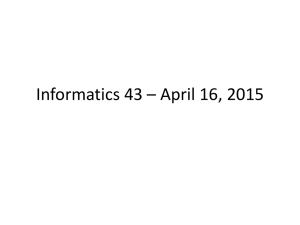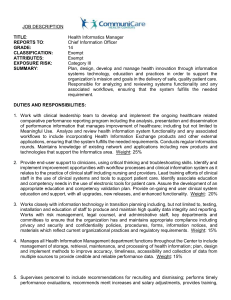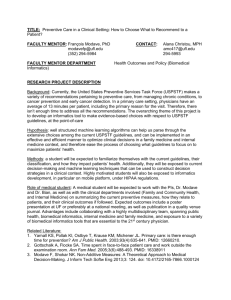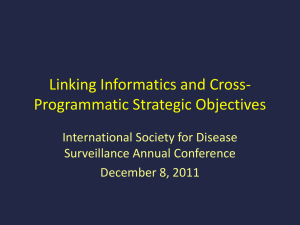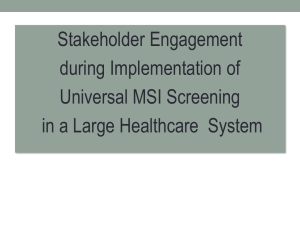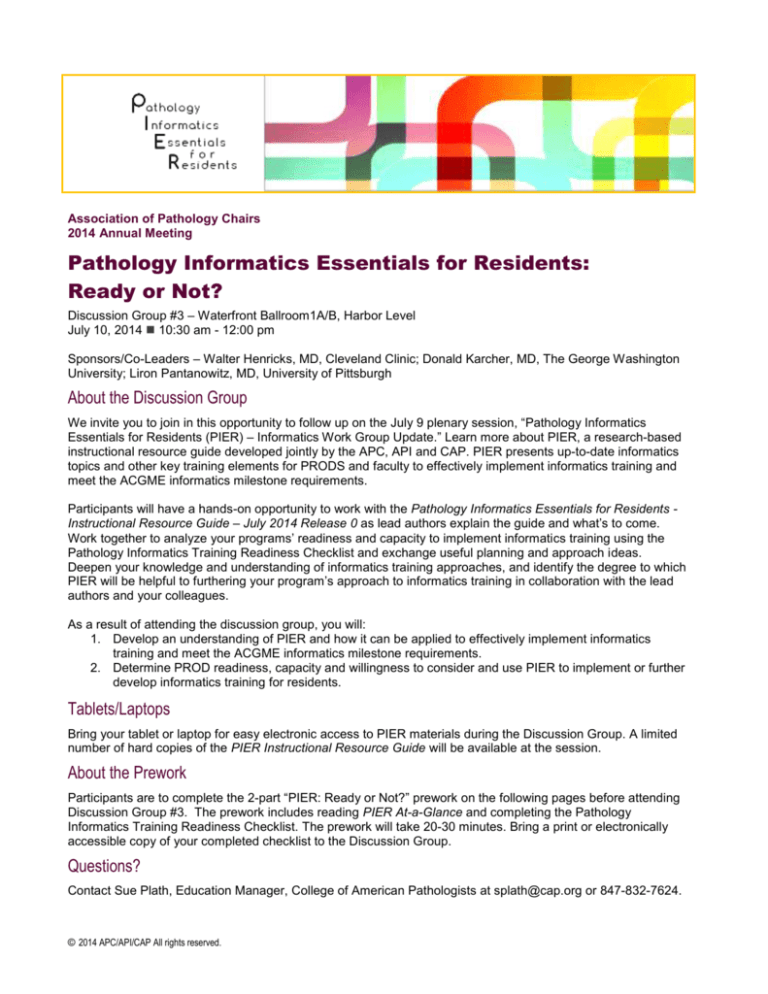
Association of Pathology Chairs
2014 Annual Meeting
Pathology Informatics Essentials for Residents:
Ready or Not?
Discussion Group #3 – Waterfront Ballroom1A/B, Harbor Level
July 10, 2014 10:30 am - 12:00 pm
Sponsors/Co-Leaders – Walter Henricks, MD, Cleveland Clinic; Donald Karcher, MD, The George Washington
University; Liron Pantanowitz, MD, University of Pittsburgh
About the Discussion Group
We invite you to join in this opportunity to follow up on the July 9 plenary session, “Pathology Informatics
Essentials for Residents (PIER) – Informatics Work Group Update.” Learn more about PIER, a research-based
instructional resource guide developed jointly by the APC, API and CAP. PIER presents up-to-date informatics
topics and other key training elements for PRODS and faculty to effectively implement informatics training and
meet the ACGME informatics milestone requirements.
Participants will have a hands-on opportunity to work with the Pathology Informatics Essentials for Residents Instructional Resource Guide – July 2014 Release 0 as lead authors explain the guide and what’s to come.
Work together to analyze your programs’ readiness and capacity to implement informatics training using the
Pathology Informatics Training Readiness Checklist and exchange useful planning and approach ideas.
Deepen your knowledge and understanding of informatics training approaches, and identify the degree to which
PIER will be helpful to furthering your program’s approach to informatics training in collaboration with the lead
authors and your colleagues.
As a result of attending the discussion group, you will:
1. Develop an understanding of PIER and how it can be applied to effectively implement informatics
training and meet the ACGME informatics milestone requirements.
2. Determine PROD readiness, capacity and willingness to consider and use PIER to implement or further
develop informatics training for residents.
Tablets/Laptops
Bring your tablet or laptop for easy electronic access to PIER materials during the Discussion Group. A limited
number of hard copies of the PIER Instructional Resource Guide will be available at the session.
About the Prework
Participants are to complete the 2-part “PIER: Ready or Not?” prework on the following pages before attending
Discussion Group #3. The prework includes reading PIER At-a-Glance and completing the Pathology
Informatics Training Readiness Checklist. The prework will take 20-30 minutes. Bring a print or electronically
accessible copy of your completed checklist to the Discussion Group.
Questions?
Contact Sue Plath, Education Manager, College of American Pathologists at splath@cap.org or 847-832-7624.
© 2014 APC/API/CAP All rights reserved.
Association of Pathology Chairs Annual Meeting
PIER Discussion Group Prework
July 10, 2014
2
Pathology Informatics Essentials for Residents
At-a-Glance
Pathology Informatics Essentials for Residents (PIER) is a research-based instructional resource guide
currently in development by the Association of Pathology Chairs (APC), the Association for Pathology
Informatics (API), and the College of American Pathologists (CAP). PIER presents training topics, knowledge
and skill statements, educational strategies and learning resource options for program directors and faculty to
effectively provide informatics training to their residents and meet ACGME informatics milestone requirements.
PIER is intended to help residency programs provide a sufficient pipeline of residents properly trained in core
informatics knowledge and skills required to practice pathology. PIER is not designed for pathologists who seek
to become pathology informaticians. However, PIER is an effective resource for aspiring specialists to develop
prerequisite pathology informatics knowledge and skills prior to advanced training or fellowships.
Developed by a large team of pathology informatics educators and experts, PIER offers program directors and
faculty:
An up-to-date and validated pathology informatics knowledge and skill set
Flexible delivery options that can be adapted by program size, needs and level of faculty expertise
Topic organizers, objectives, milestone levels, rotation planning, practical clinical applications, and
existing learning resource options, with plans to include performance evaluation methods and
implementation tips
Programs that adapt and execute PIER will provide residents with the pathology informatics knowledge and
skills necessary to practice pathology, including:
The collection, management, use and sharing of diagnostic and treatment information that enables the
delivery of accurate and high quality healthcare, and optimal patient outcomes
Ensuring that patient healthcare information is accessible to colleagues across the healthcare
environments and at every step of patient care
Release Plan
Pathology Informatics Essentials for Residents - Instructional Resource Guide – July 2014 Release 0 will be
introduced at the 2014 APC Annual Meeting. Release 1 will be alpha tested by residency programs beginning
in November 2014. Release 1 will be available for use by all residency programs during alpha testing and
validation. Future PIER updates and improvements will be delivered as available.
Pathology Informatics Topics
The pathology informatics knowledge and skill statement set is organized into eight topics:
Overview
Information System Basics
Laboratory Information Systems
Imaging Informatics
Security and Reliability
Healthcare Information Systems
Data Re-Use and Analytics
Pathology IT Leadership and Administration
The content is scoped for pathology residents to achieve the level of proficiency necessary to practice
pathology, and meet the ACGME milestone requirements.
© 2014 APC/API/CAP All rights reserved.
Association of Pathology Chairs Annual Meeting
PIER Discussion Group Prework
July 10, 2014
3
Delivery Options
When considering PIER, program directors and faculty are encouraged to begin by comparing their current
pathology informatics training approach to PIER’s topics and knowledge and skill statements, and identifying
the degree to which their current training approach is preparing residents adequately.
Using the results, program directors and faculty review PIER and its flexible delivery options, and identify how
PIER can help the program increase pathology informatics training effectiveness. Decisions regarding degree
of use and implementation sequencing are made based on the program’s rotation schedule, available faculty
expertise, delivery preferences, and program capacity. Program directors and faculty can implement the
delivery options as proposed or customize them to suit their needs and preferences. Program directors and
faculty ultimately determine and are responsible for how their residents will meet the ACGME milestone
requirements and achieve the level of proficiency necessary to practice pathology, and are encouraged to let
PIER help the program increase effectiveness and achieve success.
Authors
PIER is designed and in development by the PIER Collaboration Working Group with members and
professional staff from APC, API and CAP. CAP’s Graduate Medical Education Committee (GMEC) leads
PIER’s communication/deployment strategy. The initiative is led by:
Walter H. Henricks, MD, FCAP – Working Group Co-Leader
Liron Pantanowitz, MD, FCAP – Working Group Co-Leader
APC/PRODS is represented on the PIER Collaboration Working Group by:
Suzanne Z. Powell, MD, FCAP, CAP GME Committee Chair
Donald S. Karcher, MD, FCAP, President Elect, APC
J. Allan Tucker, MD, FCAP
Priscilla Markwood, Executive Director, APC
PIER Collaboration Working Group members are:
Raymond D. Aller, MD, FCAP
Philip J. Boyer, MD, PhD, FCAP
Victor Borisovich Brodsky, MD
Alexis B. Carter, MD, FCAP
Rajesh C. Dash, MD, FCAP
Michael D. Feldman, MD, PhD, FCAP
John R. Gilbertson, MD, FCAP
James H. Harrison Jr., MD, PhD
Anil V. Parwani, MD, PhD, FCAP
Michael Warren Riben, MD, FCAP
Rodney A. Schmidt, MD, PhD
John H. Sinard, MD, PhD, FCAP
Enrique Terrazas, MD, FCAP
J. Mark Tuthill, MD, MS, FCAP
Myra L. Wilkerson, MD, FCAP
Questions?
For further information, contact Sue Plath, Education Manager, College of American Pathologists at
splath@cap.org or 847 832-7624.
© 2014 APC/API/CAP All rights reserved.
Association of Pathology Chairs Annual Meeting
PIER Discussion Group Prework
July 10, 2014
4
Pathology Informatics Training
Readiness Checklist
Purpose
This checklist is for PRODS whose programs have a need to implement and/or further develop pathology
informatics training. Its purpose is to help PRODS identify the degree to which their programs have the
bandwidth and conditions necessary for successful implementation. Chairs may complete the checklist
assessing PROD and program readiness from the Chair’s point of view.
Instructions
For each item, click on the response option that indicates the degree to which you agree or disagree with the
statement. Then respond to the four short answer questions that follow by typing your response in the space
provided.
Bring a print or electronically accessible copy of your completed checklist to the Discussion Group on
July 10.
ITEM
Residency Program Priorities
1. Our residents need to
develop more pathology
informatics knowledge and
skills than they currently
demonstrate.
2. Implementing pathology
informatics training for
residents aligns to our
annual program goals.
3. Informatics training is one of
the top 5 academic priorities
for our program at this time.
4. We can successfully
implement informatics
training even with other
priorities and activities
currently going on in our
program.
Attitudes
5. Our residents understand
the need for and are willing
to engage in pathology
informatics education.
© 2014 APC/API/CAP All rights reserved.
STRONGLY
AGREE
AGREE
NEITHER
AGREE OR
DISAGREE
DISAGREE
STRONGLY
DISAGREE
DON’T KNOW
Association of Pathology Chairs Annual Meeting
PIER Discussion Group Prework
July 10, 2014
ITEM
6. My faculty will support the
implementation and/or
further development of
pathology informatics
training in our program
7. Personally, I am looking
forward to participating in
this work and learning more
about best practices in
pathology informatics
training.
8. I am willing to take a close
look at available materials
including PIER, and consider
using them.
Program Capacities
9. We have the IT
infrastructure available to
support pathology
informatics training (e.g.,
sufficient access to LIS,
EHR, servers and PCs).
10. As a PROD, I have faculty
who can be available to
work on implementing
and/or further developing
informatics training.
11. As a PROD, I have the
time, budget and capacity
to support the faculty and
residents in informatics
training, help make
decisions, and advise on
improvements.
Overall Readiness
12. Overall, I believe that we
are ready to implement
and/or further develop
pathology informatics
training in our program.
© 2014 APC/API/CAP All rights reserved.
STRONGLY
AGREE
AGREE
NEITHER
AGREE OR
DISAGREE
DISAGREE
STRONGLY
DISAGREE
5
DON’T KNOW
Association of Pathology Chairs Annual Meeting
PIER Discussion Group Prework
July 10, 2014
6
Your Conclusions
Analyze your responses to the items by category: priority, attitude, capacity and overall readiness. Consider
the degree to which your responses are to the right or left of the yellow indicator line. Reflect on those
particular items that you see as strong assets or liabilities.
Develop your conclusions by responding to each of the following questions. Be prepared to discuss your
observations and insights with your colleagues and presenters during the Discussion Group on July 10, and
exchange useful planning and implementation ideas.
1. What do you conclude about the level of urgency for implementing and/or further developing pathology
informatics training in your program? What are the implications of your conclusions?
2. To what degree are you and your key stakeholders – residents, faculty, others – ready or resistant? What
prerequisite conversations, decisions or activities need to take place to ensure buy-in and avoid problems?
3. What do you observe about your program’s capacity in terms of IT infrastructure, faculty, time and budget?
What can be realistically worked around and managed vs. what must be addressed before you can
proceed?
4. Given your responses, what is your current thinking on how you will define, sequence and time the work?
© 2014 APC/API/CAP All rights reserved.


